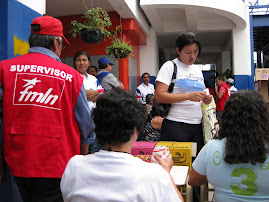The composition of my observer delegation was very interesting. Four of the eight were young women from Quebec whose native language was French. Most were more or less fluent in English and/or Spanish. One was a young Salvadoran-Canadian man who has lived in Quebec for 3 years. His English was very poor but he was able to speak some French. Two more were a husband and wife from Milwaukee. His Spanish was almost fluent while hers was very basic. I was the coordinator of the group, but my Spanish, though much improved, is still not fluent, so I often needed help with translation. The 3 of us from the U.S. speak no French. Thus an eavesdropper might hear English, French and Spanish being spoken within the group at any given moment.
In El Salvdor there may be one or more voting centers in a municipality. Within a voting center there are a number of tables which have their own voting booth and ballot box. For this election since only 2 of the 6 political parties had a candidate, there were 4 people seated at each table (called the JRV or Vote Receiving Board)--2 from ARENA and 2 from the FMLN. They sat in this order at the table: Secretary, President, 2nd Vocal, 1st Vocal. Each person at the table had a specific role. Each party was allowed 1 official Vigilante and Suplentes (substitutes) for the people at the table and the Vigilantes. If 1, or 2 observers as was the case at my table, were added, there wasn't much space left for the voters.
Unlike most voting centers in El Salvador, which are inside schools, the voting center in Chalatenango is set up on the sidewalks of two adjoining streets. You would think that this would allow for more space between voting tables, but that was not the case. It was very difficult for observers to find a place to stand without interfering with the process.
In El Salvador voters are assigned a voting center based on their last names--not on their residence. This means that many voters have to travel very long distances in order to vote. Thus a number of people were unable to reach the centers. The Supreme Electoral Tribunal (TSE) did provide free transportation in the large urban areas such as San Salvador but not in smaller municipalities such as Chalatenango. Transportation there was provided by the political parties. For this election that was the FMLN (the leftist party) and ARENA (the party of the right). Since ARENA is the party of the wealthy, there were many more buses, taxis, vans and cars bringing ARENA voters than those transporting FMLN voters.
Though Election Day in Chalatenango and in other voting centers was very peaceful, there were a number of observed cases of not following the election laws and of fraud as well as unintentional mistakes. For example, at the table I observed, the Secretary forgot to stamp the unused ballots at the end of voting. While checking through the box of voting materials, the JRV discovered the unused stamp and promptly corrected that mistake. In other municipalities voters were observed taking photos of their ballots which serves as a confirmation that employers had threatened to fire workers who did not show proof of their vote for ARENA. In Chalatenango, the President of the Municipal Voting Board offered a youth, who had forgotten to bring his DUI (official identification document), transportation to retrieve it if the youth would vote for the FMLN.
In the end, it is truly a miracle that the FMLN won this election. Prior to the election ARENA had given food and school supplies to families and make-up kits to young women and offered money to those who would vote for their candidate. Workers in large businesses such as Coca-Cola and the maquillas (garment factories) were told that the factory would close and move to another country if the FMLN won, or they were told to vote for ARENA and show proof of their votes by taking photos of their ballots with their cell phones. The 2 conservative newspapers and TV channels bombarded people with threats that a vote for Funes was a vote for Cesar Chavez of Venzuela and that remittances from the U.S. would end if the FMLN gained the presidency. Fortunately, because of messages from many of you, the U.S. Embassy in El Salvador did make a statement contradicting the latter threat and affirming U.S. neutrality in the election. Funes won this election by more than 2.5 percentage points. How much greater would that margin have been if not for vote buying and intimidation by the opposition?
Subscribe to:
Post Comments (Atom)


























No comments:
Post a Comment